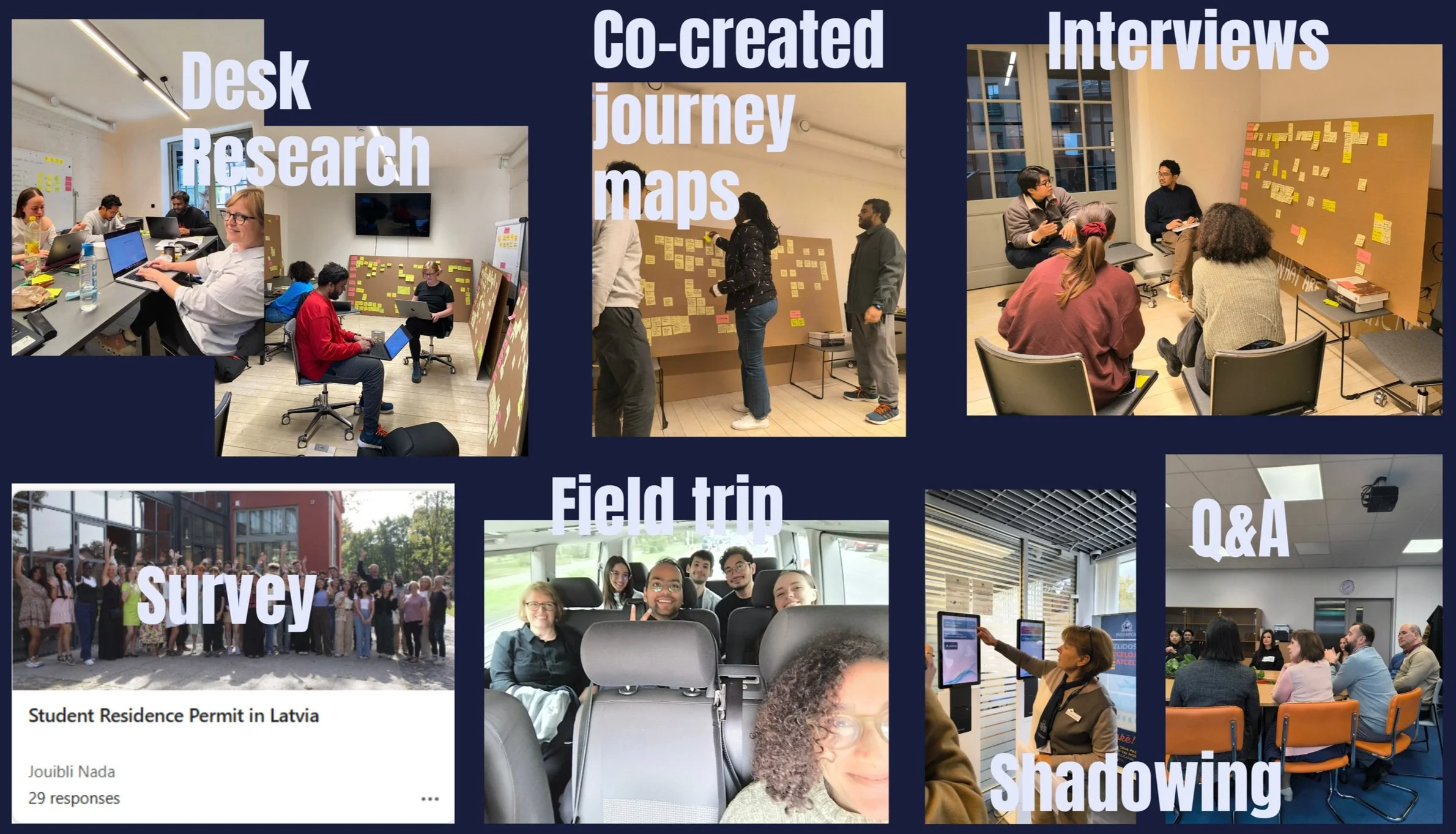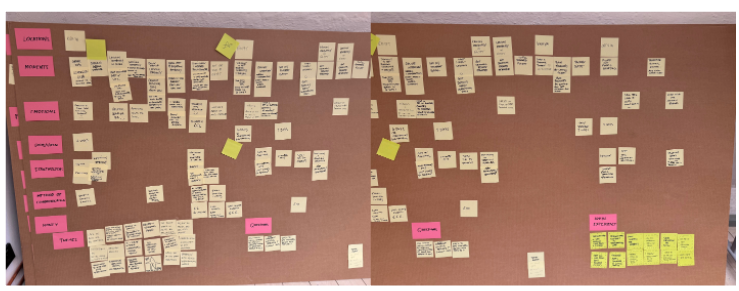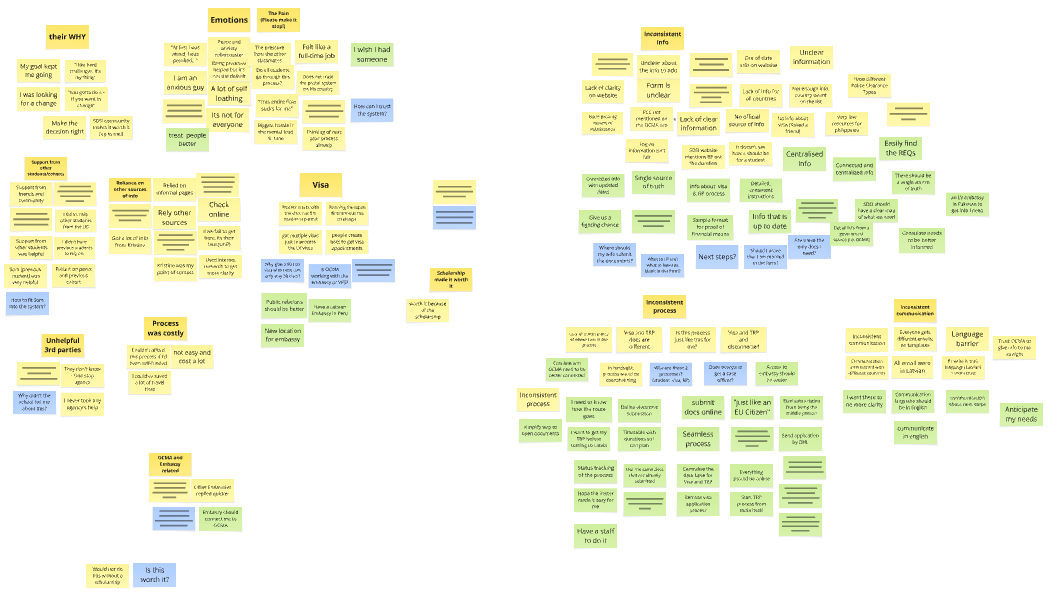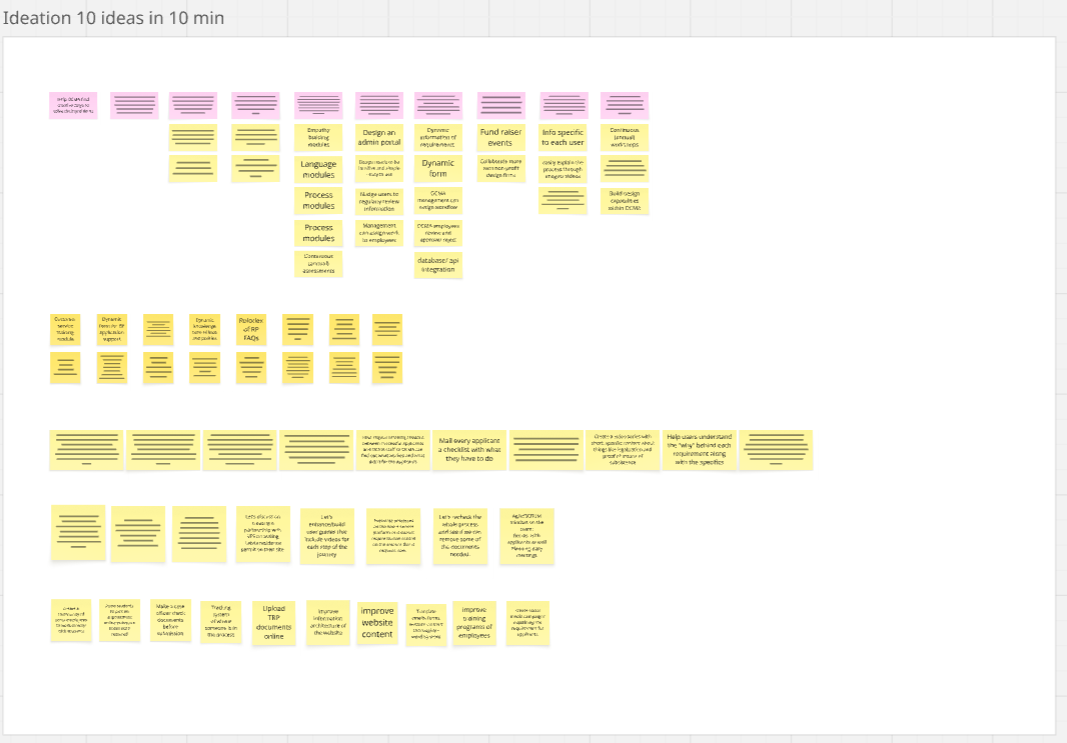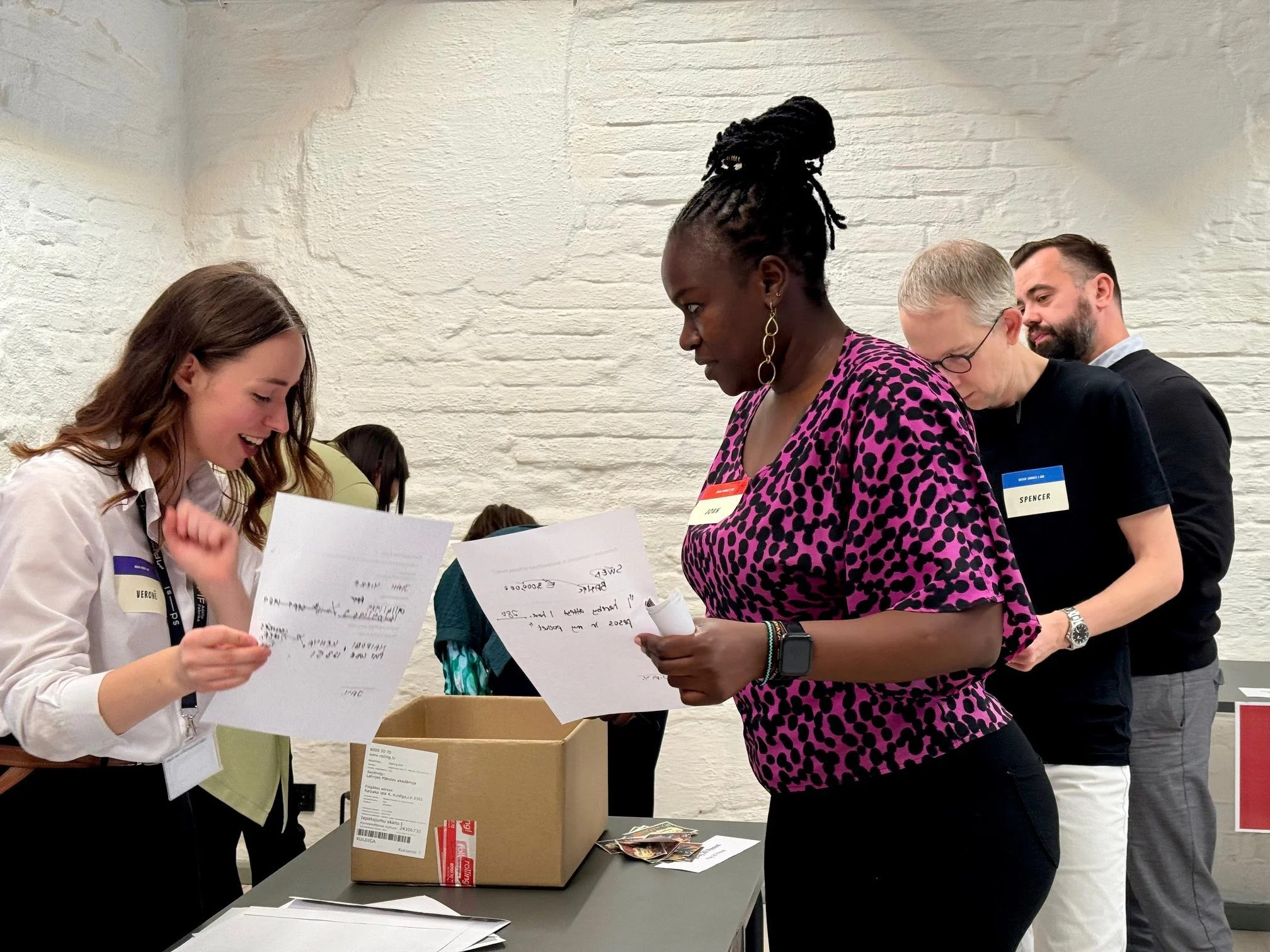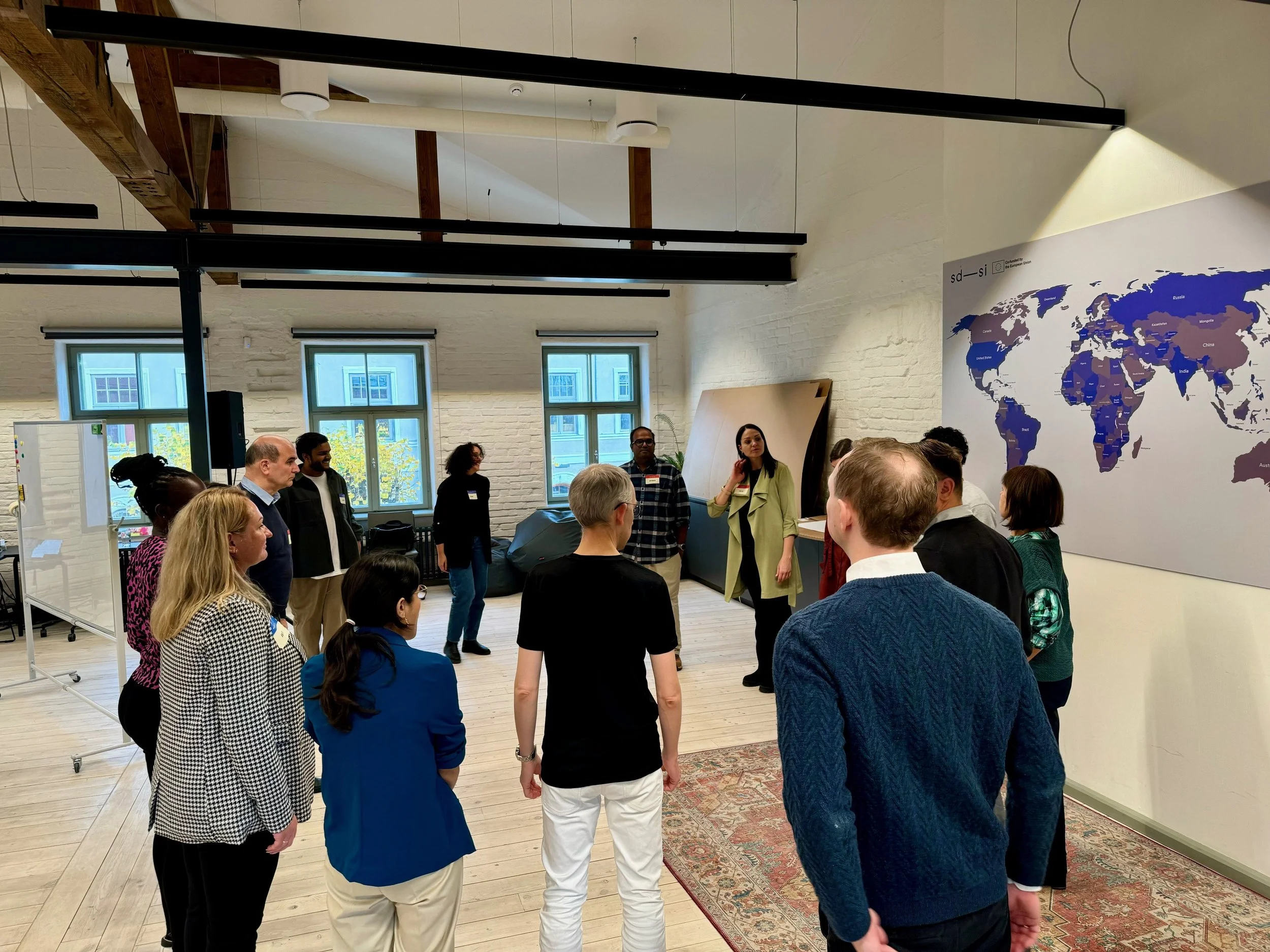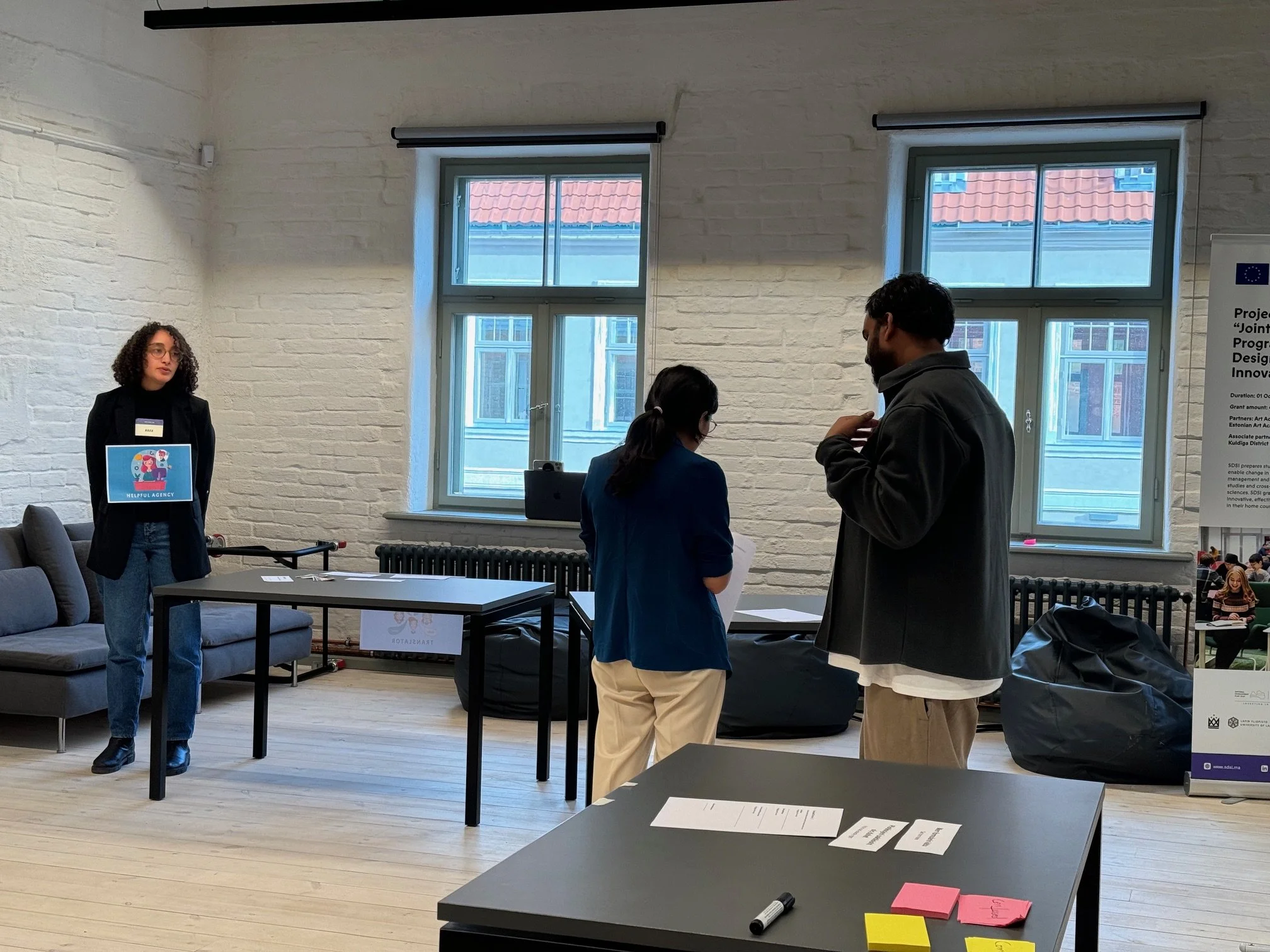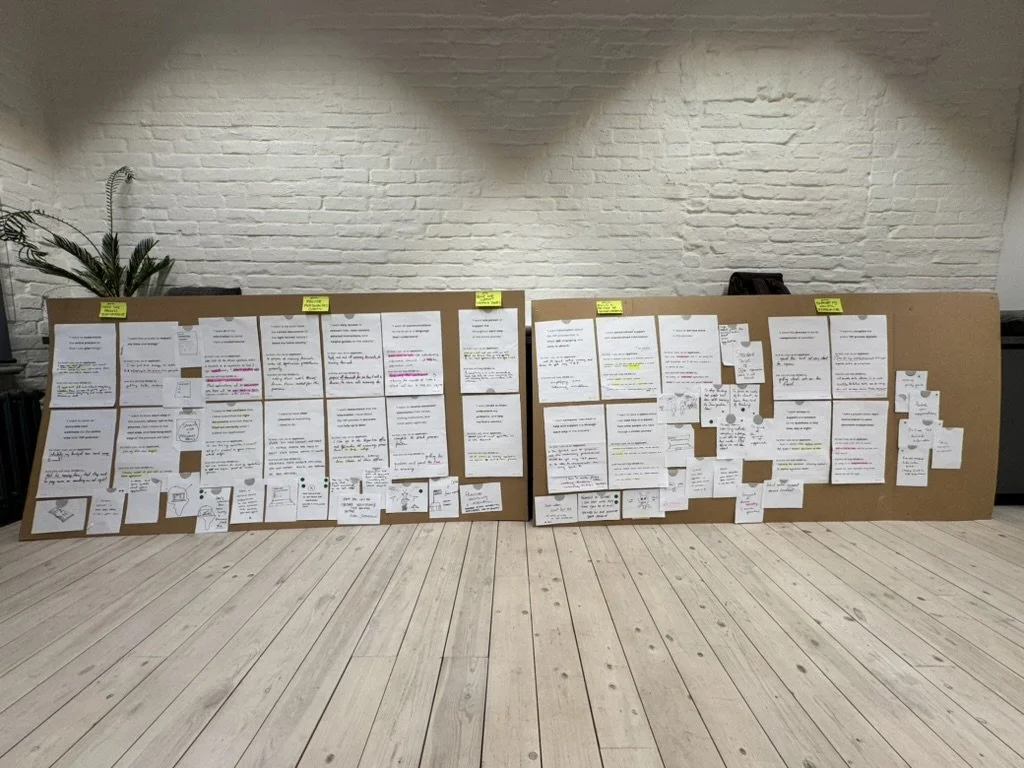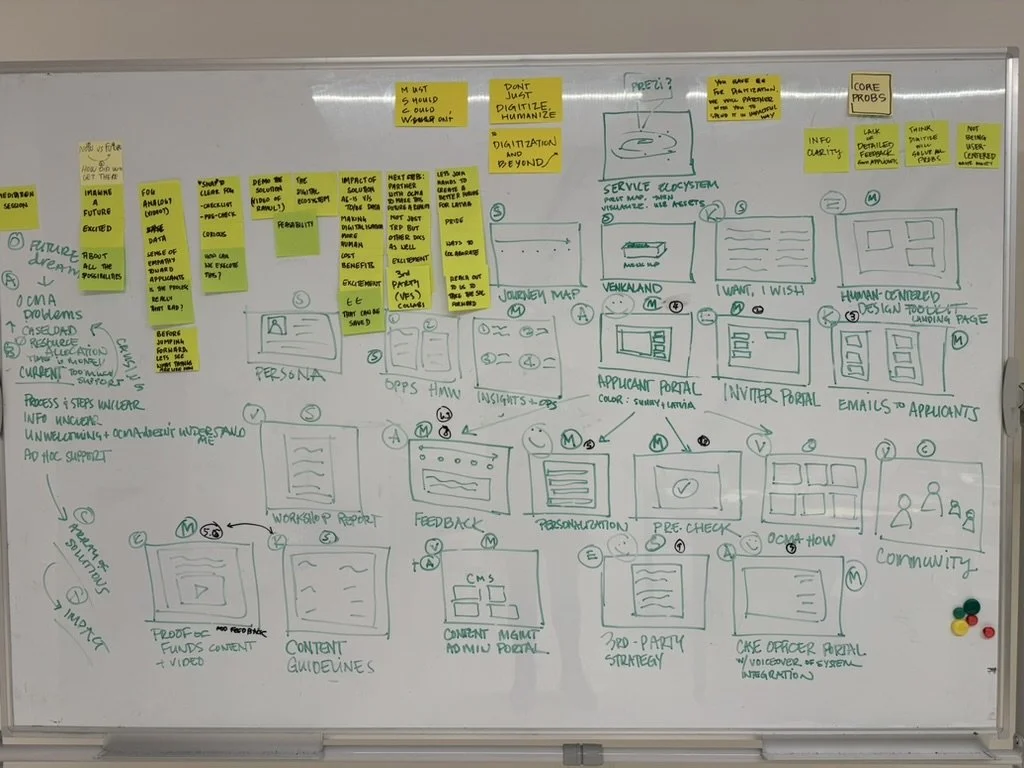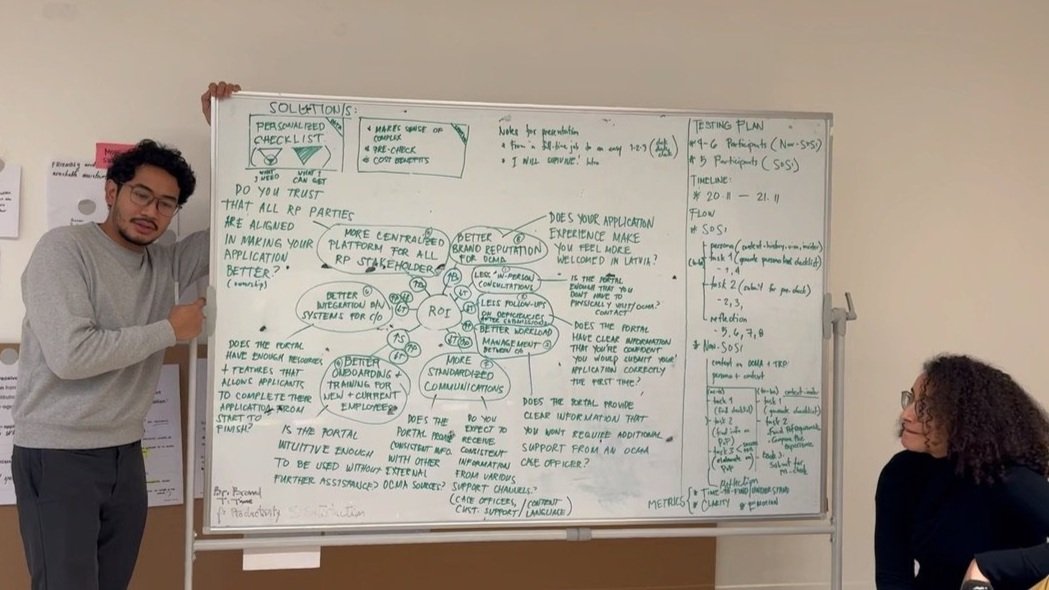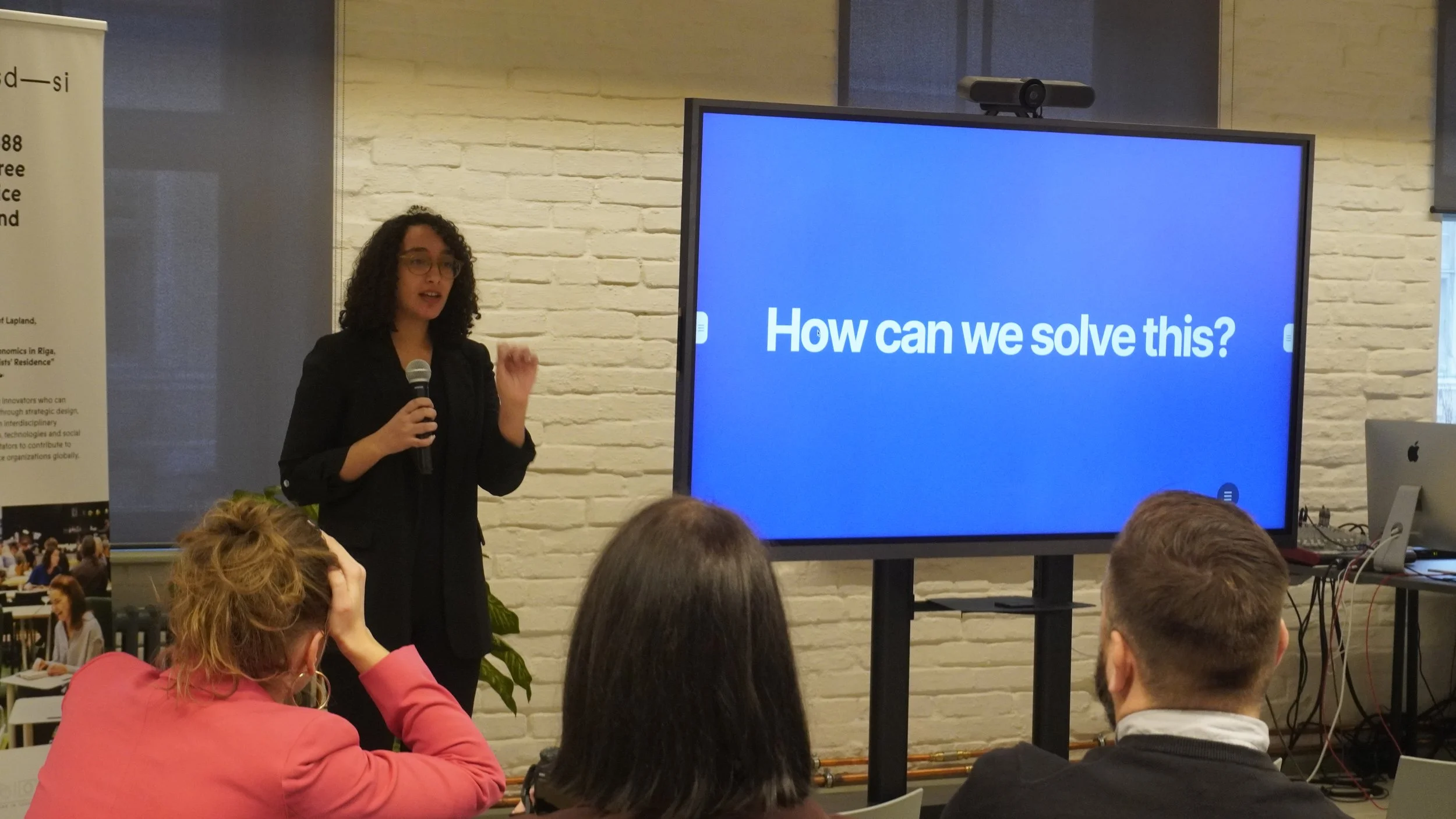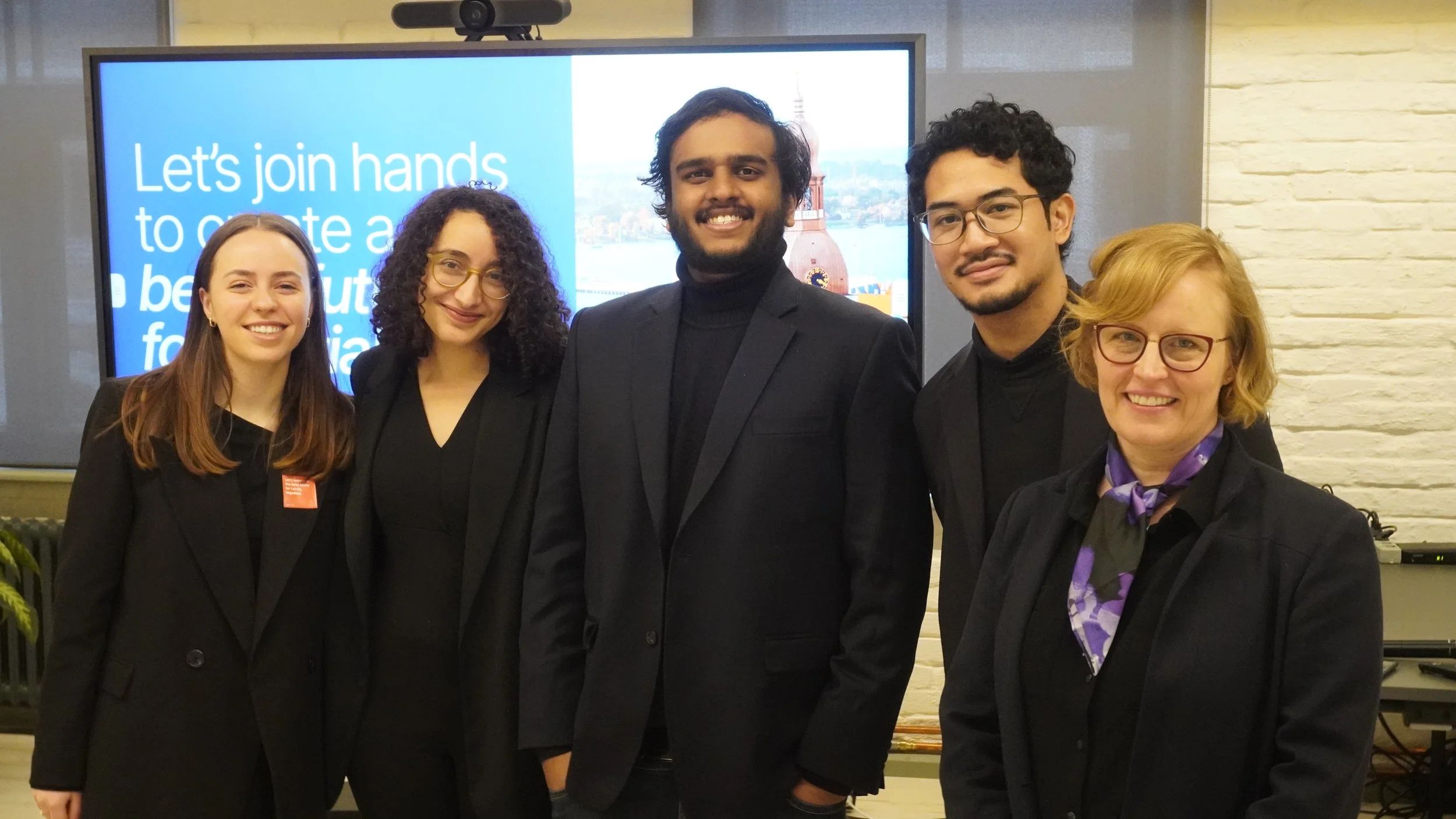sTUDENTS & Migration in Latvia
How can The Office of Citizenship and Migration Affairs improve their services and workflows to better serve international students applying for the temporary residence permit in Latvia?
Team
Verone Kadriu,
Evan Palmejar,
Nada Jouibli,
Kristen Kennedy, Abhijit Balaji
Partner
Office of Citizenship and Migration Affairs of Latvia (OCMA)
Recommendation Letter
See here
Role
Design researcher
Service designer
Facilitator
Timeframe
September–December 2024
Final Pitch
See here
Tools
Miro
Figma
The project:
Each year, thousands of international students navigate Latvia’s residence permit process. The journey is often marked by confusion, delays, and uncertainty. In partnership with OCMA, our team set out to deeply understand the applicant and staff experience, identify the root causes of frustration, and redesign the process to be clearer, more supportive, and more efficient for everyone involved.
The outcome:
Through collaborative research, co-creation workshops, and iterative prototyping with students and OCMA staff, we developed a personalized digital platform for residence permit applications. The new system offers tailored checklists, progress tracking, and in-platform support, reducing errors, saving staff time, and making the process more welcoming and manageable for international students.
Our Approach
Before teaming up:
As a team that has personally experienced OCMA’s process, we chose to tackle the problem for and with applicants. We believed that any outcome we develop must embody genuine care for individuals leaving their homes and embarking on an exciting, yet unfamiliar, journey in a new country.
Our process followed the double diamond design thinking method, moving through four key phases: Discover, Define, Develop, and Deliver.
Discover: Understanding the System
To start with, we needed to deeply understand what was really happening in the residence permit process. We began with extensive desk research, diving into social media posts where students shared their frustrations, analyzing formal complaints submitted to OCMA, and reviewing existing materials and statistics that OCMA provided. We also examined old surveys and reports to understand the historical context of these challenges.
The real insights started coming from hearing directly from those who lived through the experience. Through our primary research, we conducted 10 in-depth interviews with international students and gathered 29 survey responses that helped us quantify the scope of the problems we were uncovering.
Students reported that they were often unsure what stage they were in, whether their documents were complete, or if they were following the right steps. Many described arriving at their appointment only to learn they were missing a crucial document or an unexpected stamp. Some even had to return to their home country mid-process to retrieve some paperwork.
Define: Pinpointing the Core Issues
After gathering stories and data from students and OCMA staff, we moved into making sense of what we’d heard and observed. We synthesized our findings through affinity mapping, looking for patterns in the confusion, delays, and stress that students described. Four key themes emerged:
Lack of Process Transparency
Students struggled to understand where they were in the application journey, what steps remained, and how long each stage would take. This uncertainty made it nearly impossible to plan, budget, or feel confident about the process.
Unclear Sources of Support
With no obvious point of contact, students were left wondering whether to approach their university, OCMA, or unofficial third parties for help. Trust was a constant concern, and many relied on informal networks or peers from their own country to navigate the process.
Fragmented and Incomplete Information:
Critical details were scattered across multiple sources, often inconsistent or missing altogether. Additionally, official information and communications were provided only in Latvian, which made it incomprehensive by applicants.
Absence of Empathy and Welcome
The system felt impersonal and indifferent, rarely addressing the emotional or cultural needs of applicants. For many, the experience reinforced a sense of isolation and the feeling that they were unimportant or even unwelcome.
Define: Opportunity Framing
From these four core challenges, we identified four opportunities for transformation:
Enabling process transparency: Making every step of the journey visible and predictable, so students can confidently plan and prepare.
Delivering personalized clarity: Ensuring that information is not only accurate but also tailored to each student’s unique situation and language needs.
Creating stepping stones of support: Establishing clear, accessible pathways for students to seek help and guidance when they need it most.
Bridging understanding: Addressing the sense of isolation and lack of empathy by fostering a process that feels more human and supportive.
The following statements became the foundation for our design and ideation in the next phase:
How might we…
warmly welcome applicants to Latvia through a guided and personalized residence permit experience that prioritizes information clarity and begins the first moment they make contact with OCMA?
How might we…
create this delightful experience while meeting OCMA’s goals of reducing person hours for processing applications, improving customer satisfaction, and promoting Latvia as a prime destination for talented students and professionals?
Develop: co-creating
& Empathy Building
With our challenges and opportunities clearly defined, we began to generate ideas individually, drawing from our research insights and lived experiences as applicants. This solo ideation helped us bring a wide range of perspectives and potential solutions to the table.
To ensure our ideas were grounded in real needs, we then facilitated a co-creation workshop with OCMA management and applicants. The workshop was designed as an empathy-building game VENKALAND.
In this virtual simulation, participants were challenged to complete an application using instructions written in gibberish, mirroring the language barriers and confusion international students often face. As OCMA staff struggled to decipher forms and navigate unclear steps, they directly experienced the uncertainty and frustration described by applicants. This exercise allowed OCMA employees to step into the shoes of applicants, fostering a deeper, applicant-centered perspective.
Through collaborative activities like opportunity mapping and Crazy 8s, participants explored both the pain points and the potential benefits for all stakeholders. Together, we generated 80 innovative ideas across 11 opportunity areas.
Hypothesis 1
“If we provide easy access to a personalised checklist, applicants will have better clarity of the documents and will be able to submit a more complete application, making it easier for case officers to review and approve Residence Permit applications”
After synthesizing our team’s individual ideation and the workshop outcomes, we articulated two central hypotheses to guide our prototyping and testing:
Hypothesis 2
“If we implement a semi-automated pre-submission checker, applicants can submit error-free applications with confidence, reducing resubmissions and costs while streamlining the review process for OCMA staff.”
Building on our hypotheses, we moved into bringing our ideas to life through iterative prototyping. Our approach combined three key methods: ideal flow mapping, role-playing, and low & high-fidelity digital prototyping. These approaches allowed us to test both the practical and emotional dimensions of the redesigned process while aligning with OCMA’s digital strategy.
Deliver: Prototyping & Testing a New Experience
Keeping OCMA’s ROI in mind
Even as we refined the digital platform, we remained intentional about balancing applicant needs with OCMA’s operational goals. We visualized how every design decision could create mutual value.
Impact
Testing showed the new digital platform made the residence permit process over twice as clear and easy to use for international students. Applicants reported feeling significantly more confident and prepared, with one sharing,
“It’s much clearer. It’s separated into what I need to do before I leave my country and after I arrive in Latvia. I know what I’m doing and what is required of me. It’s very user friendly.”
For OCMA, the solution led to more complete, error-free applications on the first try, reducing back-office work and in-person consultations. As the Head of OCMA shared,
“The team’s ability to apply service design principles with empathy and strategic thinking greatly impressed us and helped us improve our user experience, streamline our processes, and gave actionable insights for OCMA’s future initiatives.”
OCMA has expressed strong interest in moving forward with the platform beyond the classroom setting. Our collaboration is set to continue, with the shared goal of making Latvia’s migration experience a model of clarity, efficiency, and care.
What I Learned
This project reminded me that it’s not enough to simply listen to people’s experiences. I have a responsibility to carry those experiences with me and design both for and with them. I also discovered the power (and fun) of role playing. Whenever I get stuck, I embody the customer, client, or service, and it never fails to inspire new ideas and momentum. Practicing this kind of deep empathy is essential, especially in government contexts where bureaucracy and rigid processes are often the default. I learned that by making it a habit to step into the shoes of those navigating these systems, I’m better equipped to challenge the status quo and build public services that are not only more efficient, but truly human-centered.



